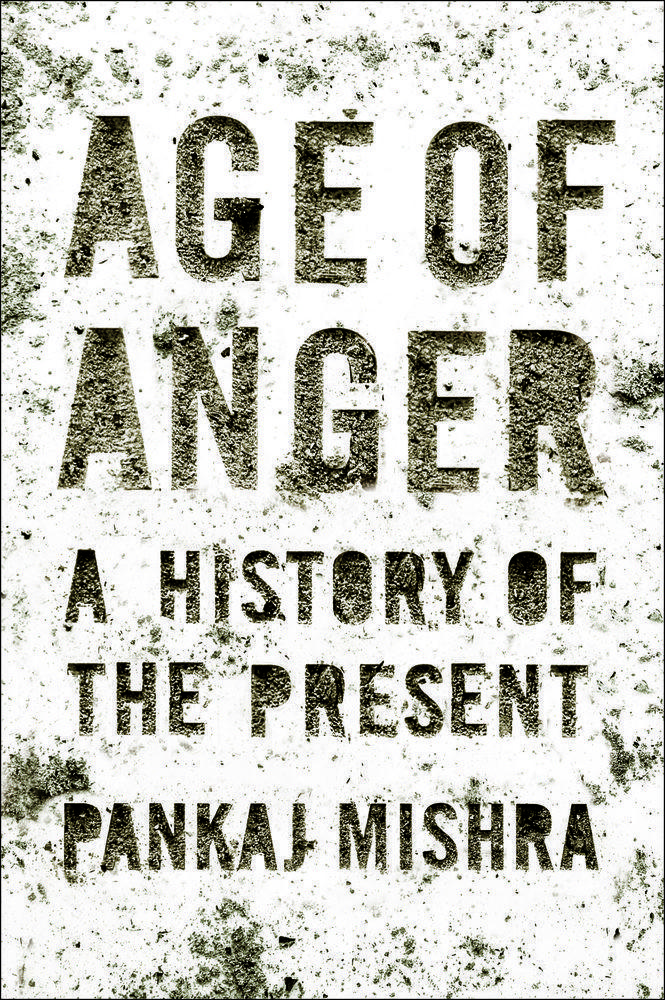Age of anger: A history of the present
William Armstrong - william.armstrong@hdn.com.tr
 ‘Age of Anger: A History of the Present’ by Pankaj Mishra (Farrar, Straus & Giroux, 416 pages, $27)
‘Age of Anger: A History of the Present’ by Pankaj Mishra (Farrar, Straus & Giroux, 416 pages, $27)A couple of years ago, on a trip to Urfa during the Feast of Sacrifice, I was invited to the home of an old local man to eat specially prepared kelle paça with his family. Mehmet, wearing traditional baggy shalvar trousers and a skull cap, was unquestionably the head of his household. His wife only surfaced to serve and take away the food.
After eating our garlic-heavy soup, we sat together on cushions propped against the wall. The TV was turned to a music video station showing pop videos from Turkey and abroad: Rappers with gold chains, half-naked women draped over cars, etc. Two worlds were colliding, but the conservative patriarch Mehmet watched impassively, commenting only on the food. I wondered what he could be thinking as he stared expressionless at the screen. What sense of defensiveness, moral superiority, alienation, attraction and revulsion was building – perhaps subconsciously – as he sat there watching?
 “Age of Anger: A History of the Present” by Indian writer Pankaj Mishra is acutely tuned to the emotional consequences of cultural dislocation wrought by globalization. Mishra argues that the political upheaval we see today reflects the rage of those disappointed by the promises of progress and prosperity. He seeks to explain why liberal technocracy and the idea of rational economic man are delusional, inescapably subject to destructive emotionalism.
“Age of Anger: A History of the Present” by Indian writer Pankaj Mishra is acutely tuned to the emotional consequences of cultural dislocation wrought by globalization. Mishra argues that the political upheaval we see today reflects the rage of those disappointed by the promises of progress and prosperity. He seeks to explain why liberal technocracy and the idea of rational economic man are delusional, inescapably subject to destructive emotionalism. The book is certainly timely. Populists in East and West are tapping into simmering reservoirs of cynicism, boredom and discontent. From the United States to India, the world manifests a fierce politics of identity built on historical injuries and fear of internal and external enemies. Mishra, who has written novels and currently writes columns for Bloomberg View, vows to explore this “climate of ideas, structure of feeling, and cognitive disposition” back to the 18th century and the advent of modernity.
The resulting book is a continent-striding intellectual whirlwind, sweeping across centuries from East to West, sometimes in the space of a single paragraph. Mishra’s approach is dizzying, sometimes brilliant, often frustratingly broad-stroke. His also indulges in some maddening generalizations, leading to a vision that is far too bleak. Much of the book’s premise is based on a straw man caricature of the 18th century Enlightenment as narrowly rationalist, based on naive assumptions that Mishra sees modern-day populists as rebelling against.
To explain today’s Age of Anger, Mishra looks back to the contrast between Voltaire and Jean Jacques Rousseau. Voltaire, in his account, is the uncompromising believer in universal secularism, rationalism and individual self-interest. Rousseau is his awkward shadow, “history’s greatest militant lowbrow.” Rousseau, Mishra writes, had a “vision of how the Enlightenment program of willed, abstract social reform could cause deracination, self-hatred and vindictive rage … darkly aware that wounded honor and the desire for glory and recognition drive human beings more than economic motives.”
Rousseau connects easily with the strangers to modernity “who feel scorned and despised by its brilliant but apparently exclusive realm.” He described the inner experience of many people: “The uprooted outsider in the commercial metropolis, aspiring for a place in it, and struggling with complex feelings of envy, fascination, revulsion and rejection.” These feelings recurred throughout the 19th and 20th centuries, as detailed in passages on Dostoevsky, Nietzsche, Herzen, and other misfits. Their bitter response to modernity, Mishra argues, was somehow more natural and honest than the hypocrisies of Voltaire’s Enlightenment progressivism, which he ambitiously claims is at the root of slavery, imperialism, communism, and the ravages of neoliberal finance.
And their response still resounds today. Mishra writes that the convulsions that accompanied the rise of the industrial capitalist economy in 19th century Europe - leading to world wars, totalitarian regimes and genocide in the first half of the 20th century - are now infecting vaster regions and bigger populations as they “negotiate the maelstrom of progress.” “Many ‘modernizing’ countries with rising literacy and declining fertility rates find themselves at political and emotional conjectures familiar to us from the history of the ‘modernized’ world,” he writes. “Mythological, religious and tribal narratives are being scripted in the age of neo-liberal individualism”
Mishra describes how frustration and inchoate rage is often inspired by desires stoked by the contemporary world. In the age of globalization that dawned after the fall of the Berlin Wall, political life became “clamorous with unlimited demands for individual freedoms and satisfactions,” he writes. “A democratic revolution of aspiration swept across the world, sparking longings for wealth, status and power, in addition to the ordinary desires for stability and contentment, in the most unpromising circumstances.” Reality is inevitably underwhelming compared to the desires provoked: “The energy and ambition released by the individual will to power far exceed the capacity of existing political, social and economic institutions.”
Added to this, technology and digital communications have improved everyone’s “capacity for envious and resentful comparison,” revealing “humiliating new hierarchies.” Mishra describes this as “ressentiment”: “An existential resentment of other people’s being, caused by an intense mix of envy and sense of humiliation and powerlessness.” The result is similar to a trend that Hannah Arendt noted in 1968: A “tremendous increase in mutual hatred and a somewhat universal irritability of everybody against everybody else.” Ressentiment is inherent in the structure of societies “where formal equality between individuals coexists with massive differences in power, education, status and property ownership.” The key to man’s behaviour, writes Mishra, “lies not in any clash of opposed civilizations, but, on the contrary, in irresistible mimetic desire: the logic of fascination, emulation and righteous self-assertion that binds the rivals inseparably.”
Many in the emerging world are “also-rans of modernity,” the kind described by Herzen in the 19th century as “uninvited guests at the feast of life.” Most of them are not the poorest of the poor, “they are educated youth, often unemployed, rural-urban migrants, or others from the lower-middle class. They have abandoned the most traditional sectors of their societies and have succumbed to the fantasies of consumerism without being able to satisfy them,” writes Mishra. “They respond to their own loss and disorientation with a hatred of modernity’s supposed beneficiaries; they trumpet the merits of their indigenous culture or assert its superiority, even as they have been uprooted from this culture.” Torn between self-adoration and malicious self-contempt, they harbor a destructive instinct.
Mishra is pessimistic that the triumphant axioms of individual autonomy and interest-seeking can work for the majority in a crowded and interdependent world. Today’s young seem doomed to hurtle, like many Europeans and Russians in the past, “between a sense of inadequacy and fantasies of revenge.” Nationalism has once again become a seductive antidote to disorder and meaninglessness. Cosmopolitan civilization based on individual self-interest has turned out to be a perilous experiment rather than a secure accomplishment, and nationalism remains its inescapable twin.
Much of this is pertinent in today’s Turkey, where the perennially angry President Recep Tayyip Erdoğan could be a poster boy for Mishra’s idea of “ressentiment.” Standing up to “arrogant and interfering” Westerners, Erdoğan “can always count upon a historical reserve of ressentiment.” He understands that resonant sentiments, images and symbols galvanize isolated individuals far more than rational argument or accurate history. Like Xi Jinping in China, Modi in India, and Putin in Russia, Erdoğan retrofits old-style nationalism for a growing population of uprooted citizens who, “like the Germans and Italians of the 19th century, have unfocused and often self-contradictory yearnings for belonging, identity and community, as well as for individual autonomy, material affluence and national power.”
But the view of history presented in “Age of Anger” is unjustifiably dark and far too selective. Mishra argues that “rationally calculating liberals always underestimate the ever-renewed political appeal of what they call ‘irrationalism.’” He, however, overestimates it. He suggests that anger is an inevitable pathology haunting all eras. No doubt that is true, but history is many-sided. The psychology behind current upheaval may resemble that behind violence of the 19th and 20th centuries, but what does that really tell us? That people can at all times be destructively irrational?
I’m not sure that conclusion warrants a sometimes exhilarating, sometimes exhausting 400-page tome.
* Follow the Turkey Book Talk podcast via Twitter, iTunes, Stitcher, Podbean, Acast, or Facebook.










